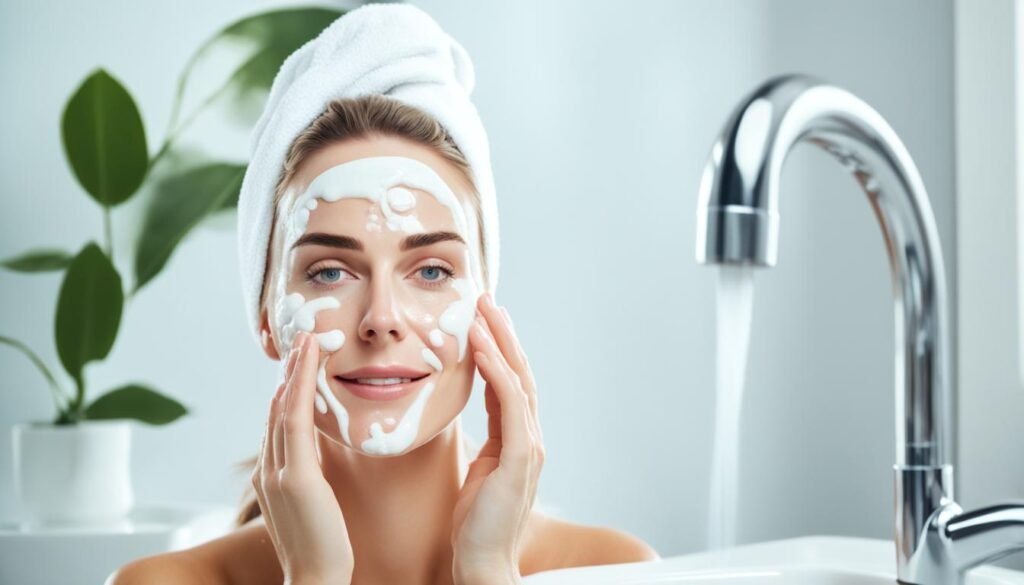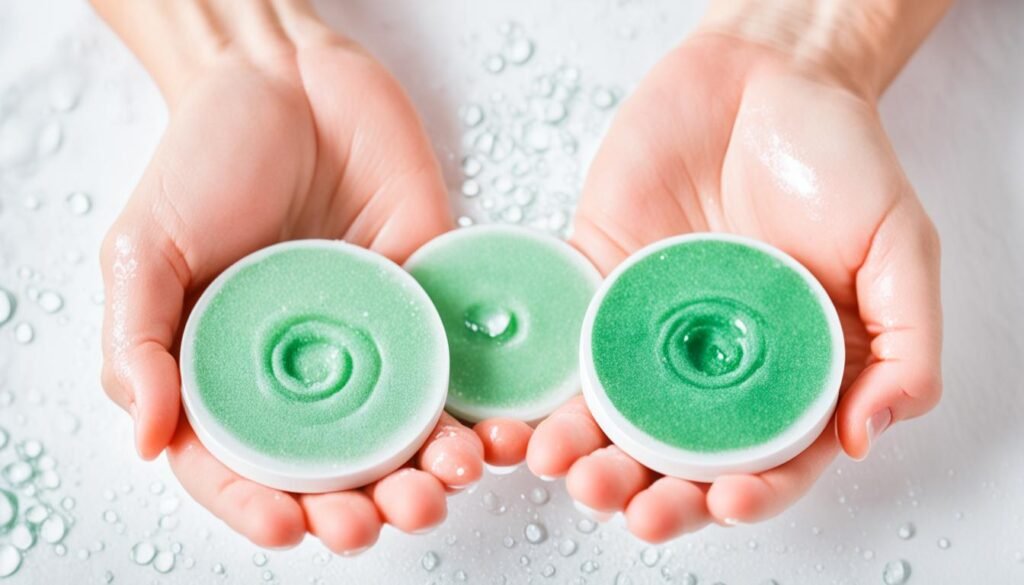Oily skin is one of the most common skin concerns. It presents some unique challenges, like a shiny complexion and acne breakouts. The good news is that with the right skin care routine and products, these issues can be less of a problem. This article provides a comprehensive guide on skin care for oily skin, covering everything from understanding the causes of oily skin to building an effective daily routine and incorporating targeted treatments.
Key Takeaways
- Oily skin is caused by excess sebum production, which can lead to shine, clogged pores, and acne.
- A proper skin care routine for oily skin should focus on cleansing, toning, exfoliating, and using targeted treatments.
- Choosing the right products, such as oil-free moisturizers and mattifying treatments, can help control shine and improve skin texture.
- Incorporating acne-fighting ingredients like salicylic acid and retinol can help prevent and treat breakouts.
- Maintaining a consistent skin care routine and avoiding over-stripping the skin are key to managing oily skin effectively.
Understanding Oily Skin
Oily skin is a common skin type that affects many individuals. This skin type is characterized by an excess production of sebum, a natural oil secreted by the sebaceous glands. Individuals with oily skin types may experience persistent shine, frequent acne breakouts, and visibly enlarged pores. Understanding the underlying causes of oily skin is the first step towards managing this skin concern effectively.
What Causes Oily Skin?
The primary driver of oily skin is the overproduction of sebum. This can be influenced by several factors, including genetics, hormonal imbalances, and environmental influences.
Genetics and Hormonal Factors
Genetics play a significant role in determining an individual’s skin type. Some people are simply predisposed to having oily skin due to their genetic makeup, which can influence the size and activity of the sebaceous glands. Hormonal fluctuations, particularly during puberty, pregnancy, or menopause, can also trigger increased sebum production, leading to an oily and combination skin type.
Environmental Influences
Environmental factors, such as climate, pollution, and stress, can also contribute to oily skin. Hot and humid environments, for instance, can stimulate the sebaceous glands to produce more oil, while exposure to pollutants can clog pores and exacerbate oily skin concerns. Stress can also disrupt the skin’s natural balance, leading to an overproduction of sebum and an increase in oily skin issues.
The Importance of a Proper Skincare Routine

Maintaining a balanced complexion and preventing acne breakouts are two of the primary goals for individuals with oily skin. A tailored skin care routine is vital for managing these issues effectively. It’s not just about removing excess oil; it’s also about maintaining the skin’s natural barrier, ensuring it remains hydrated, and using targeted treatments to prevent and reduce acne.
Maintaining a Balanced Complexion
A consistent skin care routine helps normalize the amount of sebum produced, reducing shine while keeping the skin properly hydrated and less prone to inflammation or breakouts. By incorporating the right skin care products into your daily regimen, you can achieve a healthy, balanced complexion that’s not overly oily or dull.
Preventing Acne and Clogged Pores
Oily skin is often accompanied by common skin concerns like acne and clogged pores. An effective skin care routine for oily skin should include targeted treatments to address these issues. Incorporating skin care products formulated with acne-fighting ingredients, such as salicylic acid or benzoyl peroxide, can help prevent and reduce breakouts, while also keeping pores clear and minimized.
Cleansing for Oily Skin

The most important step of any skin care routine is cleansing your skin. If your skin tends to be oily, you can likely tolerate more cleansing. Though most people should be washing their face morning and night, it’s especially important for those with oily skin to give their face a complete cleanse in the morning. Even though you might feel like your skin is still clean from the night before, during the night your skin is busy shedding skin cells and producing oils. That’s why washing with a good exfoliating cleanser, both in the morning and evening, is recommended.
Choosing the Right Cleanser
When it comes to choosing a cleanser for oily skin, it’s important to select one that is formulated specifically for oily skin types. These cleansers are designed to effectively remove excess oil, dirt, and impurities without stripping the skin of its natural oils. Look for cleansers that contain ingredients like salicylic acid, glycerin, or clay, which can help control shine and decongest pores.
Gentle Yet Effective Formulas
While it’s tempting to choose a harsh, stripping cleanser in an effort to combat oiliness, this can actually backfire and cause the skin to produce even more oil. Instead, opt for a gentle yet effective formula that won’t irritate or dry out the skin. Avoid cleansers with alcohol, fragrance, or harsh scrubbing beads, as these can disrupt the skin’s natural protective barrier and lead to increased oil production and breakouts.
Toning and Exfoliating

Once your skin care routine has cleansed your oily skin of any makeup, dirt, and excess oil, the next crucial step is to follow up with an exfoliating toner. Toners containing key ingredients like salicylic acid, glycolic acid, or lactic acid can help unclog pores, regulate oil production, and promote a brighter, more even complexion for people with oily skin.
Benefits of Toners for Oily Skin
Using a toner formulated specifically for oily skin types can offer a range of benefits. These powerful liquids can help remove any remaining impurities after cleansing, rebalance the skin’s pH, and prepare the complexion to better absorb subsequent skin care products. Oily skin tends to have enlarged pores and a shiny, uneven texture – the right toner can help minimize the appearance of pores and mattify the skin care routine for a more refined, radiant look.
Exfoliation Techniques
In addition to toners, regular exfoliation is key for managing oily skin. Chemical exfoliants containing alpha hydroxy acids (AHAs) like glycolic acid or beta hydroxy acids (BHAs) like salicylic acid can dissolve dead skin cells and unclog pores. Physical exfoliators like gentle scrubs or cleansing brushes can also help slough away built-up oil and debris. Aim to exfoliate 1-2 times per week, adjusting frequency based on your skin’s needs.
Ingredients to Look For
When selecting toners and exfoliators for oily skin care products, look for formulas that contain active ingredients like salicylic acid, glycolic acid, lactic acid, or even clay. These can help control excess shine, decongest pores, and leave the complexion looking more refined and even-toned. Avoid anything that contains alcohol or fragrance, as these can potentially irritate and dry out the skin, leading to increased oil production.
Treating and Targeting Oily Skin Concerns

For people with oily skin, managing common skin concerns like acne and enlarged pores is a top priority. Fortunately, there are targeted skin care products and treatments designed to address these issues and help maintain a clear, balanced complexion.
Acne-Fighting Ingredients
When dealing with acne-prone oily skin, incorporating acne-fighting ingredients into your skin care routine can make a significant difference. Benzoyl peroxide and sulfur are two powerful acne-fighting actives that can help curb oil production and prevent breakouts when used during the day. For nighttime, a retinol product can work to keep pores clear and promote a healthy, glowing skin appearance.
Pore-Minimizing Solutions
Enlarged pores are another common concern for those with oily skin types. Fortunately, there are effective skin care products designed to minimize the appearance of pores. Look for mattifying products and pore-minimizing serums that contain ingredients like niacinamide, which can help visibly refine pores and control excess oil production.
Moisturizing for Oily Skin

Moisturizing is a crucial step in any skin care routine, especially for those with oily skin types. There’s a common misconception that individuals with oily skin don’t need to moisturize, but this couldn’t be further from the truth. All skin types, including oily skin, require proper hydration to function at their best.
Lightweight, Oil-Free Moisturizers
When selecting a moisturizer for oily skin, it’s important to look for formulas that are lightweight and oil-free. Avoid heavy, creamy moisturizers that can clog pores and exacerbate oiliness. Instead, opt for water-based or gel-based moisturizers that are specifically formulated for oily, acne-prone skin. These non-comedogenic moisturizers will hydrate your skin without leaving it feeling greasy or weighted down.
Balancing Hydration and Oil Control
Finding the right balance between hydration and oil control is key for people with oily skin. Look for moisturizers that contain ingredients like niacinamide, hyaluronic acid, and ceramides to help hydrate your skin without triggering excess oil production. Incorporating mattifying and pore-minimizing elements can also help to keep shine at bay throughout the day.
Skin Care For Oily Skin: Product Recommendations
To help take the guesswork out of how to care for an oily complexion, we turned to a couple of skin care experts. We specifically asked them to share their top tips for developing a daily skin care routine for oily skin. The result: a simple four-step routine you can use in the morning and evening to keep your skin healthy, clear, and shine-free.
Best Cleansers for Oily Skin
For an effective cleansing step, experts recommend using a gentle, non-drying cleanser that contains salicylic acid or benzoyl peroxide. These ingredients help to control excess oil production and prevent clogged pores. Some top-rated cleansers for oily skin types include Cetaphil Dermacontrol Oil Removing Foam Wash and La Roche-Posay Effaclar Medicated Gel Cleanser.
Top Toners and Exfoliators
After cleansing, follow up with an exfoliating toner that contains alpha hydroxy acids (AHAs) like glycolic acid or lactic acid. These help to slough off dead skin cells and unclog pores. Some effective options are the Pixi Glow Tonic and the Paula’s Choice Skin Perfecting 2% BHA Liquid Exfoliant.
Effective Treatments and Serums
For targeted treatment of oily skin concerns, look for serums and treatments containing ingredients like retinol, niacinamide, and tea tree oil. These can help regulate oil production, minimize the appearance of pores, and prevent breakouts. The The Ordinary Niacinamide 10% + Zinc 1% and the Peter Thomas Roth Potent-C Targeted Spot Brightener are two top-performing options.
Mattifying Moisturizers
Finally, complete your oily skin care routine with a lightweight, oil-free moisturizer that won’t clog pores. Look for mattifying formulas that contain ingredients like dimethicone or silica to help absorb excess shine. The Cetaphil DermaControl Oil Absorbing Moisturizer and the Clinique Dramatically Different Oil-Control Gel are great choices.
A tailored skincare routine for oily skin is essential for addressing specific skin concerns and maintaining a balanced complexion. Understanding your skin type is the first step in selecting the right skincare products that cater to your skin needs, whether you have acne-prone skin, sensitive skin, or combination skin. A well-structured routine for oily skin should include products that help control excess oil without stripping the skin, keeping pores unclogged and preventing acne. Utilizing skincare products with ingredients designed for oily skin, such as those that exfoliate dead skin cells and improve skin tone, can make your skin feel and look its best. It’s important to protect the skin with non-comedogenic products that won’t clog your pores, ensuring that your skin remains healthy and vibrant. By consistently following a skincare routine that addresses the unique needs of oily skin, you can keep your skin clear, balanced, and glowing, ultimately enhancing your overall skin health and appearance.
Conclusion
“Skin Care for Oily Skin: The Ultimate Guide” provides comprehensive insights and effective strategies for managing oily skin and achieving a balanced, healthy complexion. This guide emphasizes the importance of understanding the unique needs of oily skin, which includes controlling excess sebum production while maintaining hydration and protecting the skin’s natural barrier. Key steps such as using gentle, oil-free cleansers to remove impurities and exfoliating regularly to prevent clogged pores and breakouts are crucial.
Incorporating products with ingredients like salicylic acid, glycolic acid, and niacinamide can help regulate oil production and minimize the appearance of pores. Lightweight, non-comedogenic moisturizers are essential to keep the skin hydrated without adding extra oil. Additionally, the guide highlights the significance of using sunscreen daily to protect oily skin from sun damage and prevent premature aging.
Adopting a consistent skincare routine tailored to oily skin can significantly reduce shine, prevent acne, and promote a clearer, more even complexion. By following the recommendations in this guide, individuals with oily skin can achieve and maintain healthy, balanced skin that looks and feels its best. Ultimately, this proactive approach to skincare fosters long-term benefits, enhancing both appearance and confidence.
FAQs
Q: What are the best products for oily skin?
A: The best products for oily skin are oil-free moisturizers, salicylic acid cleansers, and mattifying primers.
Q: How do I know if I have oily skin?
A: You may have oily skin if your skin feels greasy, shiny, and prone to acne breakouts.
Q: What is a skincare routine for oily skin?
A: A skincare routine for oily skin typically includes a gentle cleanser, exfoliating treatment, oil-free moisturizer, and sunscreen.
Q: How can I identify my skin type?
A: You can identify your skin type by observing how your skin feels and looks throughout the day. Oily skin tends to feel greasy and shiny.
Q: What are the best products to help control oily skin?
A: The best products for oily skin include oil-absorbing masks, clay-based cleansers, and toners with witch hazel or tea tree oil.
Q: Can oily skin be sensitive too?
A: Yes, oily skin can be sensitive as well. It’s important to choose gentle and non-comedogenic products to avoid irritation.
Q: How can I create an effective skincare routine for oily skin?
A: To create an effective skincare routine for oily skin, cleanse daily, use oil-free products, exfoliate regularly, and protect your skin with sunscreen.




